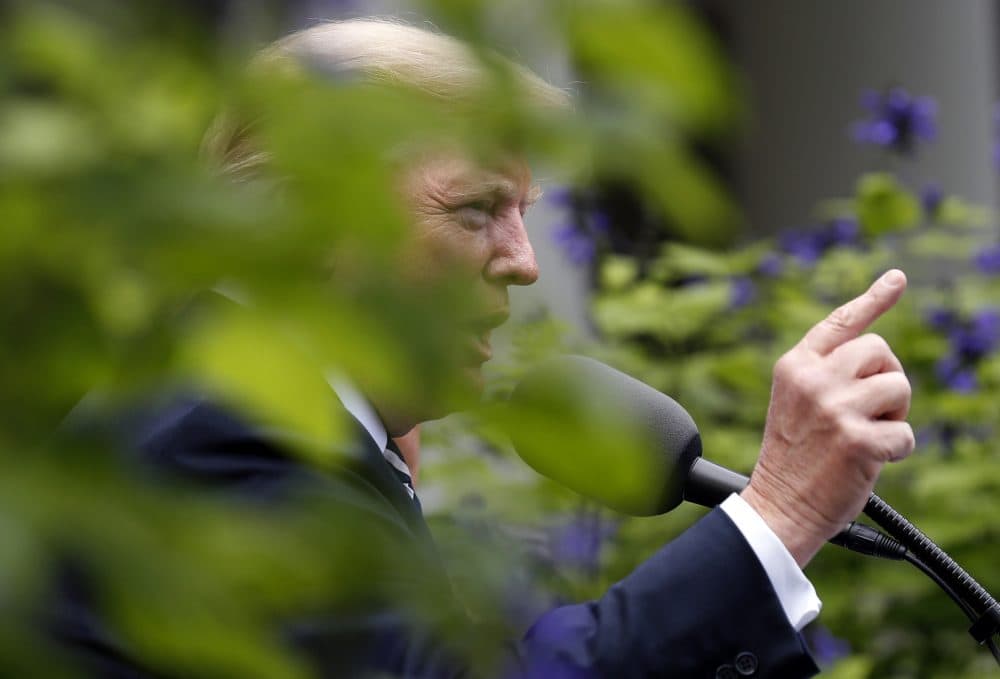Advertisement
Commentary
Is It Time To Dust Off The 25th Amendment?

To the Resistance, as President Trump’s opponents call themselves, last week’s Vanity Fair read like a heartening epistle from St. Paul, comforting believers with the good news that Satan’s legions are in turmoil.
The magazine reported that before his fall from grace as Trump’s strategist, Steve Bannon warned the president that the greatest threat to his tenure was the 25th Amendment to the Constitution, enabling the vice president and a Cabinet majority (subject to congressional approval) to declare a president “unable to discharge the powers and duties of his office.”
Talk of the 25th ricocheted in a week when the Republican chairman of the Senate Foreign Relations Committee warned that Trump’s temper tantrums, amid a crisis over North Korea’s nukes, might trigger world war, while multiple reports described presidential advisers and friends as variously shocked by his behavior and struggling to quarantine the tempestuous commander-in-chief.
The White House predictably denied many of the reported incidents, but even some Trump voters have seen through his manifest unfitness. So is it time to dust off the 25th Amendment?
No.
Any day now, I expect a tweet [from Trump], 'Harvey Weinstein: Finally, a liberal I respect.'
Banana republics may upend a free election, but functioning democracies do so only when it’s unavoidable: when a president has committed gross lawbreaking or is manifestly too impaired, physically or mentally, to serve. We aren’t there yet.
So far, what we have is, as Sen. Lindsey Graham put it, a “jackass” in office whose jackassery was the very reason many voted for him (though they called it admirable political incorrectness).
In saying we must shelve the 25th Amendment for now, I speak as someone contemptuous of Trump’s xenophobia, issue ignorance, juvenile spitballs hurled at foreign adversaries and misogyny. (Any day now, I expect a tweet, “Harvey Weinstein: Finally, a liberal I respect.”) I’m opposed to the administration’s environmental rollbacks, its sabotage of Obamacare and foolhardy tax cuts and protectionism.
But as one historian observed, the 25th wasn’t drafted to remove “a weak and untalented president … who pushes for ideas that many voters reject.” By that standard, American history would be littered with deposed executives.
Rather, the amendment, passed in 1967, was a clarification of presidential succession, years in the making, after President Kennedy’s assassination. While the Trump administration has seen the death of rational policymaking, actual presidential demise hasn’t vacated the Oval Office. Neither has resignation or removal.
But as one historian observed, the 25th wasn’t drafted to remove 'a weak and untalented president … who pushes for ideas that many voters reject.'
Some might say that last one isn’t far off, as a special prosecutor probes pro-Trump Russian meddling in the election. But absent any forthcoming evidence of collusion, we’ll be left with skullduggery by Vladimir Putin only. Other anti-Trumpers pin their hopes on his alleged violation of the Constitution’s emoluments clause, which bans a president from receiving payments from foreign governments, a concern because of Trump’s overseas business interests. A judge is to hear arguments on that this week.
Profiteering while in office obviously would take the question of whether to give Trump the hook to a new level. But unless and until that happens, our pressing concern is a world where, against the likes of North Korea, the United States has put up an ex-reality show oaf. What’s to keep us from catastrophe if not Trump’s removal? That Establishment that so many on the right and left fringes despise offers several guardrails.
I’ve mentioned the legal investigations into Trump’s campaign and finances. Meanwhile, if the Republicans running Congress were to grow a backbone, they could pass a law requiring a congressional war declaration before the president authorizes a first strike with nukes.
There’s also what we might call the Schlesinger Precedent. During Watergate, as President Nixon’s paranoia about enemies and drinking soared, Defense Secretary James Schlesinger, worried about his mental stability, ordered the military to clear any battle orders from the president with Schlesinger first. It might have been, as one scholar calls it, “the most patriotic act of treason in American history.”
One prays there are such traitors in the Trump Cabinet.
